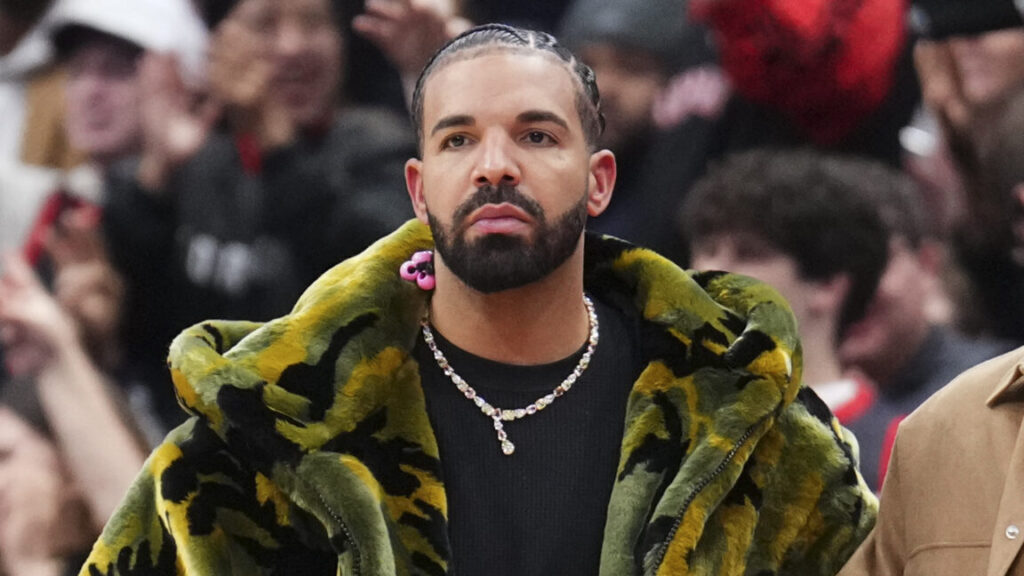Real humans don’t stream Drake songs 23 hours a day, rapper suing Spotify says
“Irregular” Drake streams
Proposed class action may force Spotify to pay back artists harmed by streaming fraud.
Lawsuit questions if Drake really is the most-streamed artist on Spotify after the musician became “the first artist to nominally achieve 120 billion total streams on Spotify.” Credit: Mark Blinch / Stringer | Getty Images Sport
Spotify profits off fake Drake streams that rob other artists of perhaps hundreds of millions in revenue shares, a lawsuit filed Sunday alleged—hoping to force Spotify to reimburse every artist impacted.
The lawsuit was filed by an American rapper known as RBX, who may be best known for cameos on two of the 1990s’ biggest hip-hop records, Dr. Dre’s The Chronic and Snoop Dogg’s Doggystyle.
The problem goes beyond Drake, RBX’s lawsuit alleged. It claims Spotify ignores “billions of fraudulent streams” each month, selfishly benefiting from bot networks that artificially inflate user numbers to help Spotify attract significantly higher ad revenue.
Drake’s account is a prime example of the kinds of fake streams Spotify is inclined to overlook, RBX alleged, since Drake is “the most streamed artist of all time on the platform,” in September becoming “the first artist to nominally achieve 120 billion total streams.” Watching Drake hit this milestone, the platform chose to ignore a “substantial” amount of inauthentic activity that contributed to about 37 billion streams between January 2022 and September 2025, the lawsuit alleged.
This activity, RBX alleged, “appeared to be the work of a sprawling network of Bot Accounts” that Spotify reasonably should have detected.
Apparently, RBX noticed that while most artists see an “initial spike” in streams when a song or album is released, followed by a predictable drop-off as more time passes, the listening patterns of Drake’s fans weren’t as predictable. After releases, some of Drake’s music would see “significant and irregular uptick months” over not just ensuing months, but years, allegedly “with no reasonable explanations for those upticks other than streaming fraud.”
Most suspiciously, individual accounts would sometimes listen to Drake “exclusively” for “23 hours a day”—which seems like the sort of “staggering and irregular” streaming that Spotify should flag, the lawsuit alleged.
It’s unclear how RBX’s legal team conducted this analysis. At this stage, they’ve told the court that claims are based on “information and belief” that discovery will reveal “there is voluminous information” to back up the rapper’s arguments.
Fake Drake streams may have robbed artists of millions
Spotify artists are supposed to get paid based on valid streams that represent their rightful portion of revenue pools. If RBX’s claims are true, based on the allegedly fake boosting of Drake’s streams alone, losses to all other artists in the revenue pool are “estimated to be in the hundreds of millions of dollars,” the complaint said. Actual damages, including punitive damages, are to be determined at trial, the lawsuit noted, and are likely much higher.
“Drake’s music streams are but one notable example of the rampant streaming fraud that Spotify has allowed to occur, across myriad artists, through negligence and/or willful blindness,” the lawsuit alleged.
If granted, the class would cover more than 100,000 rights holders who collected royalties from music hosted on the platform from “January 1, 2018, through the present.” That class could be expanded, the lawsuit noted, depending on how discovery goes. Since Spotify allegedly “concealed” the fake streams, there can be no time limitations for how far the claims could go back, the lawsuit argued. Attorney Mark Pifko of Baron & Budd, who is representing RBX, suggested in a statement provided to Ars that even one bad actor on Spotify cheats countless artists out of rightful earnings.
“Given the way Spotify pays royalty holders, allocating a limited pool of money based on each song’s proportional share of streams for a particular period, if someone cheats the system, fraudulently inflating their streams, it takes from everyone else,” Pifko said. “Not everyone who makes a living in the music business is a household name like Taylor Swift—there are thousands of songwriters, performers, and producers who earn revenue from music streaming who you’ve never heard of. These people are the backbone of the music business and this case is about them.”
Spotify did not immediately respond to Ars’ request for comment. However, a spokesperson told Rolling Stone that while the platform cannot comment on pending litigation, Spotify denies allegations that it profits from fake streams.
“Spotify in no way benefits from the industry-wide challenge of artificial streaming,” Spotify’s spokesperson said. “We heavily invest in always-improving, best-in-class systems to combat it and safeguard artist payouts with strong protections like removing fake streams, withholding royalties, and charging penalties.”
Fake fans appear to move hundreds of miles between plays
Spotify has publicly discussed ramping up efforts to detect and penalize streaming fraud. But RBX alleged that instead, Spotify “deliberately” “deploys insufficient measures to address fraudulent streaming,” allowing fraud to run “rampant.”
The platform appears least capable at handling so-called “Bot Vendors” that “typically design Bots to mimic human behavior and resemble real social media or streaming accounts in order to avoid detection,” the lawsuit alleged.
These vendors rely on virtual private networks (VPNs) to obscure locations of streams, but “with reasonable diligence,” Spotify could better detect them, RBX alleged—especially when streams are coming “from areas that lack the population to support a high volume of streams.”
For example, RBX again points to Drake’s streams. During a four-day period in 2024, “at least 250,000 streams of Drake’s song ‘No Face’ originated in Turkey but were falsely geomapped through the coordinated use of VPNs to the United Kingdom,” the lawsuit alleged, based on “information and belief.”
Additionally, “a large percentage of the accounts streaming Drake’s music were geographically concentrated around areas whose populations could not support the volume of streams emanating therefrom. In some cases, massive amounts of music streams, more than a hundred million streams, originated in areas with zero residential addresses,” the lawsuit alleged.
Just looking at how Drake’s fans move should raise a red flag, RBX alleged:
“Geohash data shows that nearly 10 percent of Drake’s streams come from users whose location data showed that they traveled a minimum of 15,000 kilometers in a month, moved unreasonable locations between songs (consecutive plays separated by mere seconds but spanning thousands of kilometers), including more than 500 kilometers between songs (roughly the distance from New York City to Pittsburgh).”
Spotify could cut off a lot of this activity, RBX alleged, by ending its practice of allowing free ad-supported accounts to sign up without a credit card. But supposedly it doesn’t, because “Spotify has an incentive for turning a blind eye to the blatant streaming fraud occurring on its service,” the lawsuit said.
Spotify has admitted fake streams impact revenue
RBX’s lawsuit pointed out that Spotify has told investors that, despite its best efforts, artificial streams “may contribute, from time to time, to an overstatement” in the number of reported monthly average users—a stat that helps drive ad revenue.
Spotify also somewhat tacitly acknowledges fears that the platform may be financially motivated to overlook when big artists pay for fake streams. In an FAQ, Spotify confirmed that “artificial streaming is something we take seriously at every level,” promising to withhold royalties, correct public streaming numbers, and take other steps, like possibly even removing tracks, no matter how big the artist is. Artists’ labels and distributors can also get hit with penalties if fake streams are detected, Spotify said. Spotify has defended its prevention methods as better than its rivals’ efforts.
“Our systems are working: In a case from last year, one bad actor was indicted for stealing $10 million from streaming services, only $60,000 of which came from Spotify, proving how effective we are at limiting the impact of artificial streaming on our platform,” Spotify’s spokesperson told Rolling Stone.
However, RBX alleged that Spotify is actually “one of the easiest platforms to defraud using Bots due to its negligent, lax, and/or non-existent—Bot-related security measures.” And supposedly that’s by design, since “the higher the volume of individual streams, the more Spotify could charge for ads,” RBX alleged.
“By properly detecting and/or removing fraudulent streams from its service, Spotify would lose significant advertising revenue,” the theory goes, with RBX directly accusing Spotify of concealing “both the enormity of this problem, and its detrimental financial impact to legitimate Rights Holders.”
For RBX to succeed, it will likely matter what evidence was used to analyze Drake’s streaming numbers. Last month, a lawsuit that Drake filed was dismissed, ultimately failing to convince a judge that Kendrick Lamar’s record label artificially inflated Spotify streams of “Not Like Us.” Drake’s failure to show any evidence beyond some online comments and reports (which suggested that the label was at least aware that Lamar’s manager supposedly paid a bot network to “jumpstart” the song’s streams) was deemed insufficient to keep the case alive.
Industry group slowly preparing to fight streaming fraud
A loss could smear Spotify’s public image after the platform joined an industry coalition formed in 2023 to fight streaming fraud, the Music Fights Fraud Alliance (MFFA). This coalition is often cited as a major step that Spotify and the rest of the industry are taking; however, the group’s website does not indicate the progress made in the years since.
As of this writing, the website showed that task forces were formed, as well as a partnership with a nonprofit called the National Cyber-Forensics and Training Alliance, with a goal to “work closely together to identify and disrupt streaming fraud.” The partnership was also supposed to produce “intelligence reports and other actionable information in support of fraud prevention and mitigation.”
Ars reached out to MFFA to see if there are any updates to share on the group’s work over the past two years. MFFA’s executive director, Michael Lewan, told Ars that “admittedly MFFA is still relatively nascent and growing,” “not even formally incorporated until” he joined in February of this year.
“We have accomplished a lot, and are going to continue to grow as the industry is taking fraud seriously,” Lewan said.
Lewan can’t “shed too many details on our initiatives,” he said, suggesting that MFFA is “a bit different from other trade orgs that are much more public facing.” However, several initiatives have been launched, he confirmed, which will help “improve coordination and communication amongst member companies”—which include streamers like Spotify and Amazon, as well as distributors like CD Baby and social platforms like SoundCloud and Meta apps—“to identify and disrupt suspicious activity, including sharing of data.”
“We also have efforts to raise awareness on what fraud looks like and how to mitigate against fraudulent activity,” Lewan said. “And we’re in continuous communication with other partners (in and outside the industry) on data standards, artist education, enforcement and deterrence.”
Real humans don’t stream Drake songs 23 hours a day, rapper suing Spotify says Read More »




